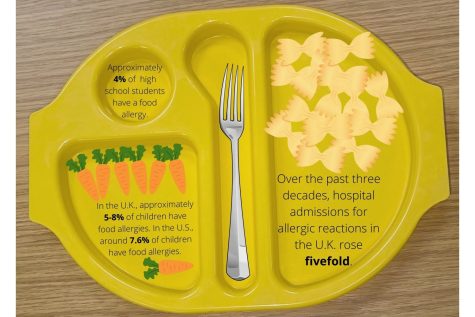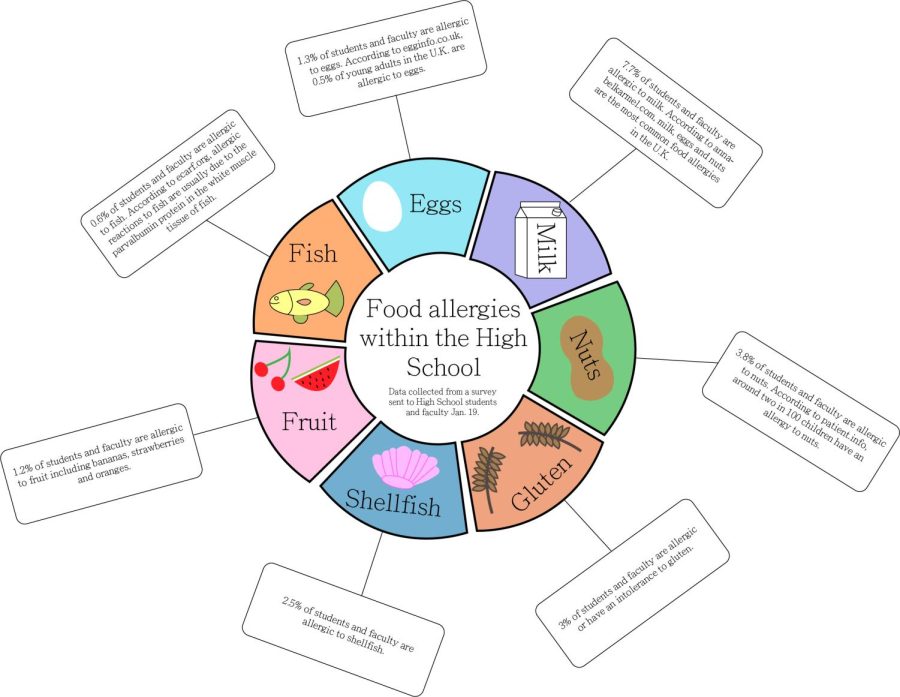For Social Studies Teacher Lina Densley, celiac disease, an autoimmune condition that triggers an immune system response to ingesting gluten, is a “constant stress” in her life.
Densely was not diagnosed until four years ago after suffering from a severe reaction on a night out with friends.
“I suddenly felt very very sick,” she said. “I went into the bathroom and lost the contents of my stomach. We called friends to come get me but I couldn’t even stand up.”
As a teenager, Densley was diagnosed with a mint allergy. She said while it does not appear in the majority of foods she eats, using mint-flavored toothpaste burns her mouth and she struggles to breath properly around mint scent.
“It’s exhausting,” she said. “There is definitely increased anxiety around anything and everything related to food.”
Densley said living on a restrictive diet is something she is “aware of at every second of the day.” She does not have the privilege to simply “pick something up and eat.”
“Now it affects every aspect of my life,” she said. “Food is such an integral part of society and people don’t even realize it.”
Confronting daily challenges
Over the past three decades, hospital admissions for allergic reactions in the U.K. rose fivefold, per New Scientist.
According to a survey sent out to High School students and faculty Jan. 19, out of the 156 respondents, 21.2% have a food allergy, with 4.5% of the allergies flagged as somewhat severe and 2.6% as very severe.
Among those who participated in the survey include Campbell Lazar (’23), who said she was diagnosed with an allergy to eggs at 1 year old after going into anaphylactic shock.
Food is such an integral part of society and people don’t even realize it.
— Social Studies Teacher Lina Densley
Lazar said she last suffered from an allergic reaction Nov. 3 while she was playing a soccer match. She said although the instance was frightening, the solution was straightforward: she “got medicine and it was fine.”
“I think I ate something beforehand,” she said. “In the middle of the game, I could feel as though I started getting itchy and sort of felt as if something was wrong, so I went off the field.”
Lazar said this reaction – the first since she was diagnosed – evoked concern surrounding her safety. As a result, she began carrying an EpiPen in her school bag every day as a preventative measure.
Likewise, Densley said not only do her allergies influence what she packs in her bag every day, but also where she eats. For example, she said she only eats at restaurants that are entirely gluten free.
“Because I have such a severe reaction to just the tiniest little bit of cross contamination, I just don’t risk it,” she said. “The few times I have, I’ve ended up very sick and have had results that last for weeks afterwards. It is not worth the risk.”
In addition, Densley said before she applied for a job at the school, she was looking to teach in Asia, away from her hometown in California. However, she said once she was diagnosed with celiac disease, she pulled back from job opportunities in Asia.
“Asia in particular is very difficult when it comes to gluten,” she said. “Not speaking enough languages fluently to be able to identify foods to be safe … makes it very very complicated to live in a lot of places or travel.”
Similarly, Naomi Hart (’25), who is allergic to eggs, nuts and shellfish, said while traveling, she is particularly conscientious about what she eats; she said it can be challenging to express her dietary requirements abroad.
“On vacations I get most stressed out because, especially when you’re in a foreign country, no one really knows how to help you,” she said.
For Densley, when traveling, her number one priority is whether there is going to be food that fits her dietary restrictions. She said she carries her own cooking supplies in order to prevent any cross contamination.

“I bring my own pots, pans and dishes with me, even cutting boards,” she said. “I have to bring that with me when I travel so that I have safe access to be able to cook my own food. I can’t just use anybody’s pans, they might be contaminated.”
Moreover, Densley said her disease not only dictates where she lives, but also with whom she lives. She said it is important to ensure that home is her “safe space.”
“The thing that’s made it best is getting the people that I live with and choosing relationships with people that are willing to go 100% allergen free in my home,” she said.
The school’s approach
Densley said in addition to creating a safe, allergen free environment in her home, she values the school’s support in ensuring her health. She said she is fortunate to work at a school where the catering staff “take allergies very seriously.”
“We have a really fabulous staff here,” she said. “They actually prepare my lunch separate from everybody else’s, and I don’t get my lunch off of the same tray as everybody else does. After three years, I have never gotten sick.”
Likewise, Hart said she appreciates that the catering staff always label the allergens on packaged food items.
“The school is really good with allergies,” she said. “Anything that has nuts on it, they will say on the packaging. My experience has been pretty good.”
Potential solutions
Moving forward, Hart said it is necessary that those with food allergies get tested early on and work to try and overcome any intolerances.
“Allergies form when you are really little and if you build the tolerance for your allergy when you are really little, it is a great way for people to not have allergies as they grow older,” she said.
Meanwhile, Densley said she is continuously following the news surrounding research on food allergies. She said she is hopeful that reactions due to cross contamination will decrease in the future.
“I know a lot of research right now is less about allowing people to just eat the food all together and more about how do we prevent severe reactions from just that tiny little bit,” she said. “And if they could do that, honestly, that would make the biggest difference in the world for me.”







